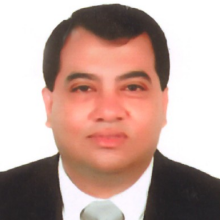
Biography
Mr. Saber Chowdhury is a distinguished politician with an impressive track record in public service in Bangladesh and extensive experience in inter-parliamentary relations. He is the 28th President of the Inter-Parliamentary Union.
Prior to his election, he served as President of the IPU Standing Committee on Peace and International Security (2010 – 2014) and, briefly, as a member of the IPU Standing Committee on United Nations Affairs (2014).
As IPU President, he is also a member of the high level group - Every Woman Every Child - a global movement to champion the health of women, children and adolescents led by the UN Secretary-General Ban Ki-moon. The group’s members comprise leaders from governments around the world, the international business community, philanthropists and prominent young people.
Having begun his career as an entrepreneur, Mr. Chowdhury embraced full-time politics in 1996. He has been prominent in the enactment of ground-breaking legislation through private member bills on repeal of the Leper’s Act (doing away with the segregation of lepers and facilitating their treatment and integration into society) and the criminalization of custodial torture.
As a former prisoner of conscience who was subjected to detention and custodial violence, he tabled a private member bill in Bangladesh’s Parliament in accordance with the provisions of the United Nations Convention against Torture and Other Cruel, Inhuman and Degrading Treatment or Punishment, which was adopted as the Torture & Custodial Death (Prohibition) Act, 2013. He also successfully promoted a constitutional amendment aimed at protecting the environment and biodiversity for present and future generations.
He has also pioneered community initiatives on issues such as health care, tobacco control, youth empowerment, self-employment schemes, urban microcredit for women and legal aid. Mr. Chowdhury served as Deputy Minister of Ports & Shipping and, later, as Deputy Minister for Local Government, Rural Development & Cooperatives, one of Bangladesh’s largest development Ministries (1999-2001).
Much of his political effort has focused on climate change, disaster risk reduction, nuclear non-proliferation and disarmament, sustainable development and the post-2015 development agenda. He co-authored a joint parliamentary Inquiry on climate change equity by the Parliaments of Bangladesh and the United Kingdom, a worldwide first in inter-parliamentary cooperation and networking, which was released in Copenhagen in December 2009 during the fifteenth session of the Conference of the Parties to the United Nations Convention on Climate Change (COP 15).
He has been actively involved in Commonwealth Parliamentary Association (CPA) initiatives and served as a CPA resource person on orientation and capacity-building for Members of Parliament from Africa and the Small Island Developing States (SIDS) at the meeting of the Small Island and Developing States Study Group on the Role of Parliament in Climate Change, held in Zanzibar, Tanzania, in May 2011.
In November 2012, at the invitation of the United Nations Development Programme (UNDP) Office in Viet Nam, Mr. Chowdhury shared his experience in the adoption of disaster risk reduction legislation with the National Assembly of Viet Nam.
As Chair of the Asian Advisory Group of Parliamentarians for Disaster Risk Reduction and Global Champion of the United Nations Office on Disaster Risk Reduction (UNISDR), he worked with parliamentarians in Seoul (Rep. of Korea) in 2012 and Vientiane (Lao People’s Democratic Republic) in 2014 and led the process of parliamentary consultations on a new Hyogo Framework for Action beyond 2015.
As Co-President of Parliamentarians for Nuclear Non-Proliferation and Disarmament (PNND), championing the cause of international peace, he has urged that resources dedicated to nuclear weapons should be made available for development purposes.
As President of the Bangladesh Cricket Board (BCB) from 1996-2001, Mr. Chowdhury was instrumental in the country’s elevation to full membership of the International Cricket Council. During his Presidency, the BCB was bestowed with the Independence Award, Bangladesh's highest national honour. Marylebone Cricket Club at Lords, England, awarded him honorary life membership in 2003, in recognition of his services to cricket as an administrator.
Mr. Chowdhury is a graduate of the University of London School of Oriental and African Studies and holds a joint Honours degree in economics and politics. He has also received a diploma in law from the University of Westminster, United Kingdom.

